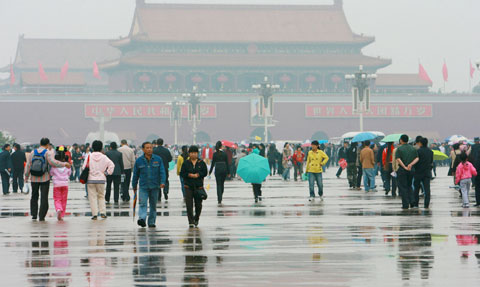Poll to alter holidays launched
Updated: 2007-11-10 08:34
The National Development and Reform Commission (NDRC) conducted a massive online poll on Friday seeking public opinion on a new holiday plan that cuts one of the three Golden Week holidays and adds three traditional festivals to the list.
|
|
The new holiday plan cuts the May Day holiday from three days to one day, and for the first time adds a day each - the Tomb-Sweeping Day, Dragon-Boat Festival and the Mid-Autumn Festival - to the list of legal holidays, a statement on the NDRC website said.
New Year's Day will still be a holiday, as will be the Spring Festival and the National Day - each lasting three days - except that the Spring Festival holiday will start from the Lunar New Year's Eve instead of the New Year's Day, that is, when people actually begin celebrating.
If the new plan is approved, people can enjoy a total of 11 legal holidays, up from the existing 10. Combining the weekends before and/or after a legal holiday, people are expected to enjoy two weeklong and five three-day holidays a year.
The national legal holiday adjustment research group, which drafted the plan, said it is based on more than one year's investigation and research. It denied media criticism that it had not sought public opinion on the changes, saying it had conducted surveys over the phone in some cities and conducted online polls on a few websites.
For this poll, the research group expanded its base by putting the questions not only on official websites, but also on popular portals such as sina.com.
An NDRC official said that November 15 will be the last day to send in replies, and the result would be considered before giving the final touch to the new holiday list.
He, however, declined to give an exact date for the announcement and implementation of the new plan. Earlier reports said next year's holiday plan would be announced later this month, though.
The current holiday system was introduced in September 1999 to boost domestic consumption, with 28 million people traveling across the country during the first Golden Week in October 1999 and generating 14.1 billion yuan ($1.88 billion) in tourism revenue.
Those figures jumped to 146 million people and 64.2 billion yuan ($8.56 billion) revenue during the last National Day Golden Week holiday.
But an increasing number of people have been complaining of overcrowded trains, stations, airports, buses and terminuses and tourist spots during the Golden Weeks.
In a public poll conducted by sina.com last month, more than half, or 54 percent, said they would like a change in the present holiday system.
But Liu Deqian, deputy director of the Tourism Research Center under the Chinese Academy of Social Sciences, warned that a new plan could lead to more traffic problems and even bigger crowds at tourist spots during the National Day holiday.
|
|
|
||
|
||
|
|
|
|
